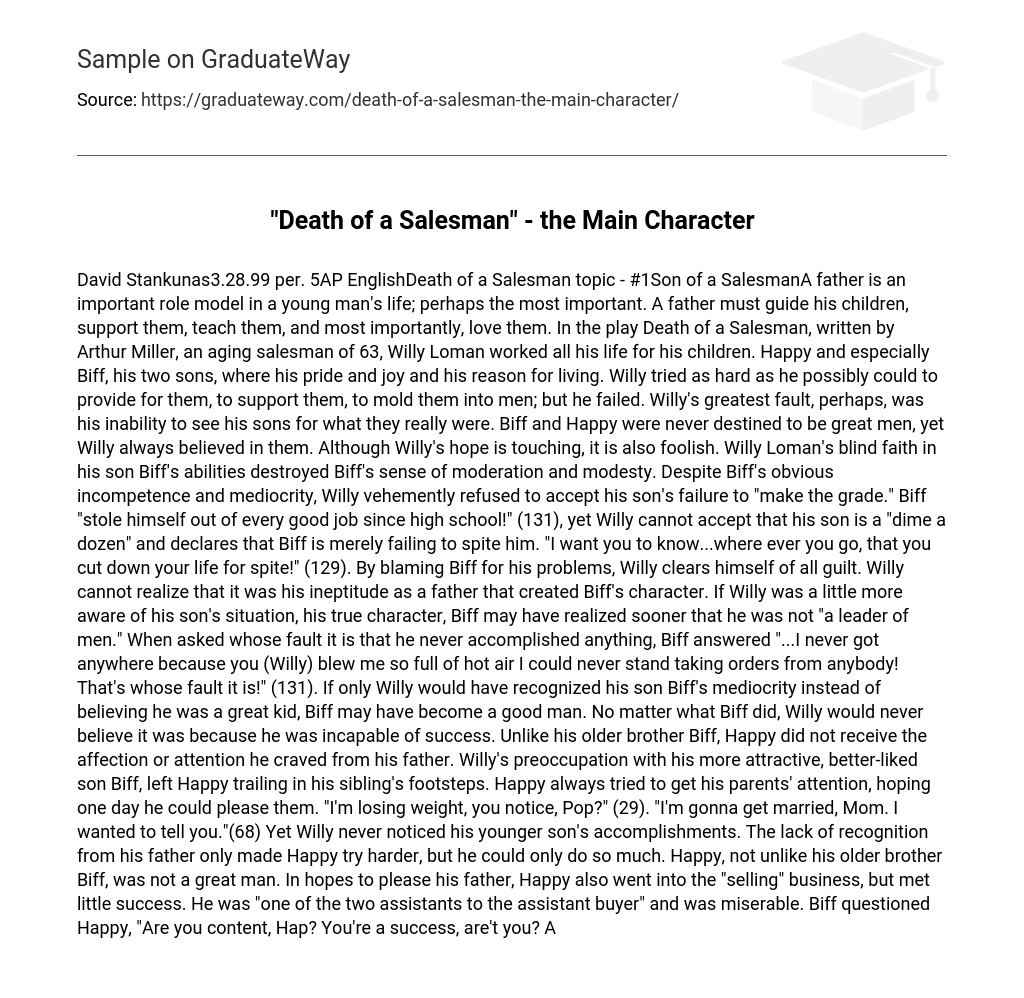The role of a father is incredibly important in the life of a young man, potentially the most significant. A father’s duties involve guiding, supporting, instructing, and primarily loving his children. In Arthur Miller’s play Death of a Salesman, Willy Loman, a 63-year-old salesman, devoted his entire existence to his children. Happy and especially Biff, his two sons, were the cause of his pride and joy as well as the motivation behind his being.
Despite all of Willy’s efforts to provide and support his sons, and to shape them into men, he ultimately failed. Willy’s biggest flaw was his inability to see his sons for who they truly were. Biff and Happy were never meant to achieve greatness, yet Willy always held onto the belief in their potential. While Willy’s hope is moving, it is also misguided.
Willy Loman’s unquestioning belief in his son, Biff, caused Biff to lose his sense of restraint and modesty. Even though Biff was clearly unskilled and average, Willy adamantly refused to acknowledge his son’s inability to succeed. Biff repeatedly ruined good job opportunities for himself since high school. However, Willy cannot admit that Biff is commonplace and claims that Biff is only failing to spite him. Willy accuses Biff of intentionally sabotaging his own life out of spite. By placing the blame on Biff, Willy absolves himself of any responsibility. Willy fails to comprehend that it was his own incompetence as a father that molded Biff’s character.
If Willy had been more conscious of his son’s circumstances, Biff might have realized earlier that he was not “a leader of men.” When questioned about the reason why he never achieved anything, Biff exclaimed, “…I never got anywhere because you (Willy) inflated me with so much nonsense that I couldn’t bear taking orders from anyone! That’s whose fault it is!” (131). If only Willy had acknowledged his son Biff’s mediocrity instead of believing that he was exceptional, Biff may have become a respectable man. Regardless of what Biff accomplished, Willy would never accept that it was because Biff lacked the ability to succeed. In contrast to his older brother Biff, Happy did not receive the love or attention he desired from his father.
Despite Willy’s obsession with his son Biff’s attractiveness and popularity, Happy was left constantly following in his sibling’s footsteps. Hoping to gain his parents’ attention, Happy always tried to please them, and even pointed out his weight loss and plans to get married. However, Willy never acknowledged the achievements of his younger son. This lack of recognition further motivated Happy to try harder, but there were limits to what he could do.
Happy, like his older brother Biff, was not successful. He joined the “selling” business to please his father but had little success. He was one of two assistants to the assistant buyer and was unhappy. Biff asked Happy if he was content and if he considered himself a success, but Happy replied that he was not content. Despite his unhappiness, Happy continued working in the hope of one day making his father proud. Even after Willy’s death, Happy did not give up on his mission. He vowed to prove that Willy Loman’s life was not in vain and declared that he would stay in the city and defeat this difficult situation.
Happy, in his desperate attempt to gain his deceased father’s approval, condemns himself to a fate similar to his father’s. Despite never truly knowing his father, it is possible that Happy’s admiration would have wavered had they been able to have open conversations. If Willy had taken the time to connect with his son and share his thoughts and feelings, Happy may have chosen a different path for himself. Unfortunately, Willy focused all his attention on Biff, leaving Happy feeling abandoned and craving attention. The lack of moral guidance within the Loman household further contributed to the decline of both Biff and Happy. These two boys lacked a positive role model in their lives, which undoubtedly affected their development.
Willy praised Biff’s resourcefulness when he stole a football and encouraged both his sons to steal construction materials for a new porch. Biff likely developed his kleptomania tendencies from his father’s acceptance and even endorsement of stealing during his youth. However, Biff’s admiration for his father completely dissipated when he discovered Willy’s affair with another woman. At that moment, Biff realized that the man he had always idolized was nothing but a fraud, causing him to lose all purpose in life.
Everything Willy taught him was invalidated on that one night, as his act of adultery nullified every rule and piece of advice. Despite his efforts to be a good father, Willy Loman’s contributions were ultimately futile. He consistently encouraged and dedicated his life to his sons, offering any assistance possible. However, despite his heartfelt intentions, Willy’s parenting fell short. He attempted to raise his sons to the best of his abilities, but tragically, their behavior worsened as he continued to try.
In the end, Willy was unsuccessful as a father, but he did make an effort. He had a deep love for his children, sometimes even excessive. He adored them without reservations and never doubted their potential. While this kind of affection is heartwarming, it can also be damaging. Willy’s inflated expectations for his sons ended up causing more harm than good.





